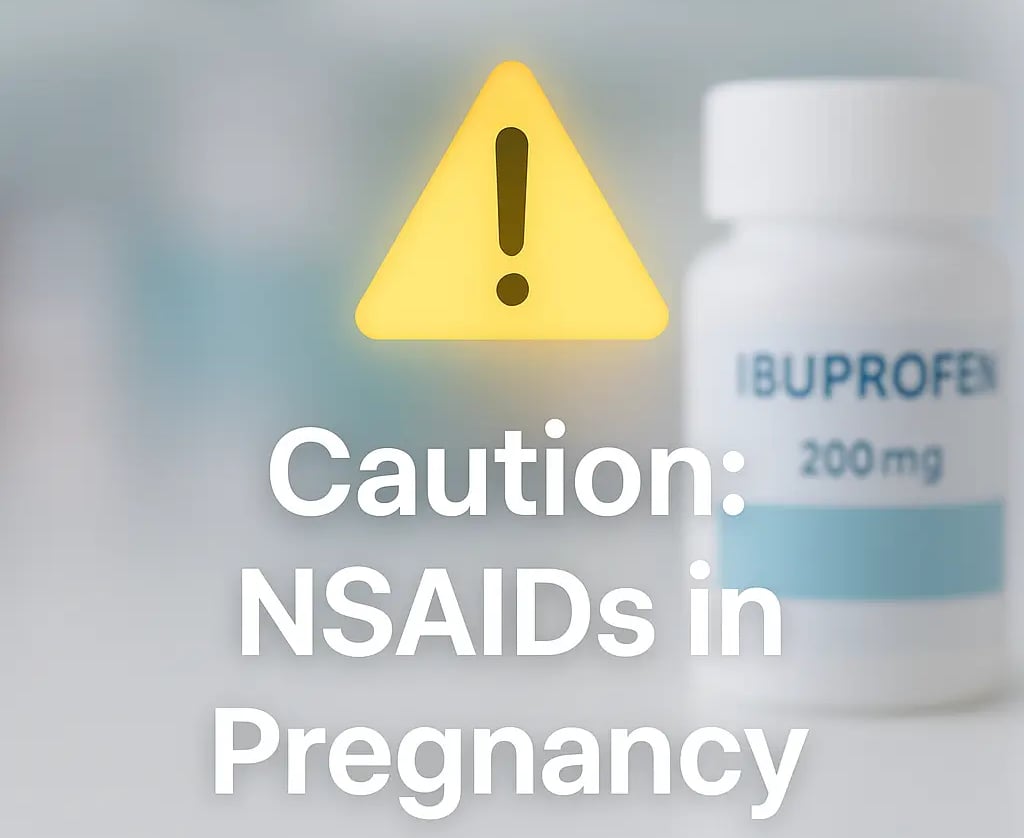Is Ibuprofen Safe During Pregnancy? Risks, Trimester Guidelines, and Safer Alternatives
Is ibuprofen safe in pregnancy? Learn trimester-by-trimester risks, FDA and ACOG guidance, and safer pain relief alternatives like acetaminophen.


Is Ibuprofen Safe During Pregnancy? Risks, Trimester Guidelines, and Safer Alternatives
Can You Take Ibuprofen While Pregnant?
Ibuprofen is a widely used over-the-counter pain reliever, but its safety during pregnancy is a complex issue. While some medications are considered generally safe throughout pregnancy, ibuprofen is not one of them — especially in later stages. Medical guidelines from trusted sources like the FDA and the American College of Obstetricians and Gynecologists (ACOG) recommend avoiding ibuprofen during pregnancy unless specifically directed by a doctor.
The concern with ibuprofen during pregnancy lies in how it may affect fetal development, particularly after the 20th week of gestation. It can interfere with the development of the baby's kidneys, heart, and other critical systems. For this reason, acetaminophen (Tylenol) is often recommended as the safer alternative for pain and fever during pregnancy.
Why Ibuprofen Is Risky During Pregnancy
Research has shown that ibuprofen can cause reduced levels of amniotic fluid (oligohydramnios), premature closure of a vessel in the fetus’s heart (the ductus arteriosus), and kidney problems — particularly when taken in the second or third trimester. Even in early pregnancy, there is some evidence linking ibuprofen use to increased risk of miscarriage, when taken frequently or in high doses.
It’s important to remember that “safe” use of ibuprofen during pregnancy should only be determined by your healthcare provider. If you're trying to manage pain or inflammation while pregnant, talk to your doctor before taking any NSAID, including ibuprofen.
FAQ
Can I take ibuprofen in the first trimester?
It's not recommended. While the risks are lower in early pregnancy, studies still suggest a possible link between NSAID use and miscarriage. Talk to your provider if you’re wanting to take it.
Why is ibuprofen dangerous after 20 weeks?
After 20 weeks, ibuprofen may reduce kidney function in the fetus and lower amniotic fluid. After 30 weeks, it poses a risk of premature closure of a key heart vessel in the baby.
What about occasional use while pregnant — like one or two doses?
Some providers may allow limited use in early pregnancy, but you should never self-prescribe ibuprofen during pregnancy. Always consult your OB-GYN first.
Is acetaminophen a better alternative?
Yes, acetaminophen is widely regarded as safer for occasional use during pregnancy. However, even this should be used at the lowest effective dose and only when necessary. Always best to discuss this with your OB-GYN.
Can ibuprofen affect fertility before pregnancy?
There’s limited but growing evidence that regular NSAID use may affect ovulation and implantation. If you’re trying to conceive, it may be wise to avoid ibuprofen.
Disclaimer
This page summarizes information from trusted medical sources and is provided for general knowledge only. lt is not medical advice; Always consult your doctor or pharmacist for personal medical guidance (For a more comprehensive explanation please see the full disclaimer).
Resources
The information above has been gathered from several reputable sources, including the following:
[1] FDA
[2] March of Dimes
[3] WebMD


